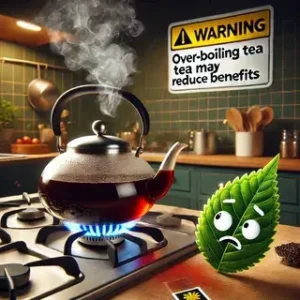If you’ve ever encountered the phrase “Spot of tea?” in a New York Times (NYT) crossword puzzle, you may have wondered about its true meaning. Does it refer to a cup of tea? Is it a British phrase? Or is it simply a clever wordplay?
As someone who enjoys both crossword puzzles and a good cup of tea, I decided to dive deep into the origins, cultural significance, and different interpretations of the phrase.
In this detailed guide, I will explore:
✅ The true meaning of “spot of tea”
✅ British vs. American interpretations of the phrase
✅ The historical background of British tea culture
✅ The NYT crossword puzzle connection and wordplay
✅ How modern slang has transformed the meaning of “tea”
✅ Fun facts, myths, and misconceptions surrounding the phrase
✅ Tips for solving tricky NYT crossword clues
Let’s explore the phrase “spot of tea?” in its deepest and most comprehensive form!
What Does “Spot of Tea” Really Mean?
A “spot of tea” is a phrase most commonly associated with British English, but its interpretation varies significantly between the UK and the US.
🔹 British vs. American Understanding of “Spot of Tea”
| Phrase | British Meaning | American Interpretation |
|---|---|---|
| “Spot of tea” | A small amount of tea, not necessarily a full cup | A full cup or serving of tea |
| “Have some tea” | A light meal with tea (often with snacks) | Simply drinking a cup of tea |
| “Tea time” | A scheduled break for tea (Afternoon Tea or High Tea) | Any time tea is consumed |
In the UK, if someone says “Fancy a cuppa?”, they mean “Would you like a cup of tea?”. However, in the US, the phrase “spot of tea” is often misunderstood as a reference to British afternoon tea traditions, when in reality, it simply means a small serving of tea.
Origins of “Spot of Tea” in British Culture
The term “spot” in older British English was commonly used to refer to a small amount of something. This usage naturally extended to tea, leading to the phrase “a spot of tea”, meaning a small drink of tea rather than a full tea ceremony.
📜 A Brief History of British Tea Culture
- 1600s – Tea was introduced to England by Dutch and Portuguese traders.
- 1662 – Queen Catherine of Braganza, wife of King Charles II, made tea fashionable in the English court.
- 1700s – The British East India Company dominated the tea trade, making tea widely accessible.
- 1800s – Anna, the Duchess of Bedford, popularized Afternoon Tea, a light meal served with tea, scones, and sandwiches.
- 1900s–Present – Tea became an integral part of daily life in Britain, leading to phrases like “a cuppa” or “a spot of tea”.
While afternoon tea remains a luxurious British tradition, the phrase “spot of tea” itself is more casual and less commonly used in modern Britain.
“Spot of Tea?” NYT Crossword Clue Explained
Now, let’s talk about how this phrase appears in The New York Times crossword puzzle.
If you see the clue “Spot of tea?”, you might think the answer relates to tea drinking. However, the correct answer is often “RUMOR”.
🧐 Why is “RUMOR” the Answer?
This is an example of wordplay and double meaning, a common trick in NYT crossword puzzles.
✔ “Spot” can mean a small amount or a stain/mark.
✔ “Tea” in modern slang means gossip or news.
✔ A “rumor” is essentially a small bit of gossip.
💡 Example crossword clue:
“Spot of tea?” (5 letters) → RUMOR
The NYT crossword often plays with multiple meanings, so it’s important to think beyond the obvious.
How “Tea” Became Slang for Gossip
In recent years, the word “tea” has taken on a whole new meaning in modern slang.
💬 In today’s world, “tea” means gossip, drama, or juicy news. This usage became popular in Black and LGBTQ+ communities, especially through drag culture and social media.
☕ Examples of Modern “Tea” Slang:
- “She spilled the tea about her breakup!” (She shared the gossip.)
- “What’s the tea on that celebrity scandal?” (What’s the gossip?)
Because of this modern meaning, the NYT crossword clue “Spot of tea?” makes perfect sense—it refers to a bit of gossip, not an actual drink!
Common Myths and Misconceptions About “Spot of Tea”
There are many myths and misunderstandings surrounding this phrase, especially in American culture. Let’s clarify them:
❌ Myth #1: British People Say “Spot of Tea” All the Time
➡ In reality, Brits rarely use this phrase today. They simply say “Fancy a cuppa?” instead.
❌ Myth #2: It Always Refers to Afternoon Tea
➡ A “spot of tea” does not mean a formal tea session. It originally meant a small amount of tea.
❌ Myth #3: Afternoon Tea and High Tea Are the Same
➡ Afternoon Tea is a fancy tradition, while High Tea was originally a working-class meal.
Tea Culture in Britain vs. America
Tea culture in the UK and the US differs significantly. Here’s a breakdown:
| Aspect | British Tea Culture | American Tea Culture |
|---|---|---|
| Popularity | The most popular drink | Less common than coffee |
| Tea Type | Hot tea with milk | Iced tea (sweetened or unsweetened) |
| Terminology | “Cuppa,” “Brew” | “Tea,” “Iced tea” |
| Traditions | Afternoon Tea, Cream Tea | Southern Sweet Tea, Iced Tea |
Tips for Solving NYT Crossword Clues Like “Spot of Tea?”
If you enjoy NYT crossword puzzles, here are some pro tips to help you crack tricky clues:
✅ 5 Tips for Solving Cryptic Crossword Clues
1️⃣ Think Beyond the Literal Meaning – Clues often use puns and wordplay.
2️⃣ Look for Hidden Meanings – “Spot” doesn’t always mean “place,” and “tea” doesn’t always mean “drink.”
3️⃣ Use Crossword Solvers – Websites like Wordplays or Crossword Solver can be helpful.
4️⃣ Break Down the Clue – Identify each word’s possible meanings.
5️⃣ Check the Letter Count – If the clue is “Spot of tea?” (5 letters), think of words like “RUMOR” rather than “CHA” (tea).
Final Thoughts
The phrase “Spot of tea” is fascinating because it has multiple meanings depending on context, culture, and even modern slang. While it may have originated as a simple phrase for drinking tea, today, it has evolved into a fun crossword clue and a pop culture reference.
Key Takeaways:
✔ In British English, “spot of tea” originally meant a small amount of tea.
✔ In NYT crosswords, “Spot of tea?” often refers to RUMOR (a small bit of gossip).
✔ In modern slang, “tea” means gossip, making the crossword clue a clever play on words.




